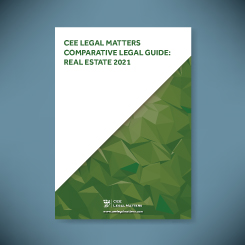Contributed by RER Lextal.
1. REAL ESTATE OWNERSHIP
1.1 Legal framework
The property rights are fundamental rights of a person (also a legal person), the protection of which is provided for in Article 105 of the Constitution. Everyone has the right to own and protect legally obtained property, including real estate. The protection of the real estate title and rights of usage is provided by both Civil Law and Criminal Law. The protection of real estate rights is exercised in civil proceedings in court.
Property rights may be restricted only in accordance with the law. Expropriation of property for public purposes is allowed only in exceptional cases on the basis of a specific law and in return for fair compensation. Latvia is a member of the Council of Europe and ensures the level of protection of property rights set by the European Convention on Human Rights.
The procedure and criteria for obtaining residential or commercial property is the same for Latvian and EU residents. Special restrictions are applicable to the acquisition of land plots and agricultural land, which applies to anyone who decides to purchase this type of property.
Land plots may be acquired by citizens of EU member states, as well as citizens of European Economic Area (EEA) countries and member states of the Organization for Economic Co-operation and Development (OECD) and registered capital companies that are taxpayers in the Republic of Latvia in accordance with regulatory enactments.
Foreign nationals, non-EU EEA OECD citizens have to deal with additional restrictions, a ban on acquiring land in the state border zone, as well as in certain areas, and requirements for obtaining a residence permit.
In recent years, especially in 2021, Latvia has been experiencing demand and growth in the real estate market. Increasing activity is being experienced in all sectors of the real estate market, including residential property, land property, commercial property such as office, warehouse facilities, and shopping centers.
1.2 Registration of ownership
Real estate rights and also the securities and restrictions of rights are registered in Land Register. Registration in the Land Register is provided by the district (city) court of which the immovable property to which the registration of rights applies has been entered. The Land Register contains information about registered ownership, encumbrances mortgages, servitudes, pre-emptive rights, and other rights and obligations pertaining to real estate. If the rights acquired on the basis of the transaction, for example, the right of pledge, are not registered in the Land Register, this endangers the stability of such rights.
In general, buildings and the land on which they are located are considered to be uniform property. Buildings and the land on which they are located may belong to different persons only in exceptional cases. Both buildings and the land are registered in the Land Register in the same folio except if the buildings constitute an independent property. Also, in practice, there may be situations where the building is not registered in the Land Register.
Before carrying out a real estate transaction, it is recommended to look into the status of the real estate as well as encumbrances, the allowed use of the land plot stated by the municipality, territorial planning, other agreements relating to the real estate, etc.
1.3 Publicity of real estate register
Land Register entries are available to everyone and the entries thereof are publicly reliable. Information on the Land Register entries and the rights attached to real estate can be obtained using public databases for a fee. However, it is possible to get acquainted with or receive the documents available in the Land Register only by proving that there is a legally justified interest in receiving such information.
1.4 Protection of ownership
Only a person who has been registered in the Land Register is recognized to be the owner of real estate. A real estate owner may bring an ownership action against any person who is illegally retaining his or her property; the objective thereof is a declaration of ownership rights and in connection therewith, granting of possession. The real estate owner may also claim damages if proven damage has occurred as a result of an unlawful violation of property rights.
Until registration in the Land Register, acquirers of real estate do not have any rights against third persons, they may not use any of the priority rights associated with ownership, and they must recognize as valid any acts pertaining to such immovable property by the person who is indicated, pursuant to the Land Register, as the owner of such real estate. However, the acquirer of real estate has the right not only to request compensation for all acts done in bad faith by the earlier owner pertaining to the real estate, but also to request that the latter take all the appropriate steps to register the passing of the real estate in the Land Register.
2. REAL ESTATE ACQUISTION
2.1 Share deal or asset deal?
Share deals and asset deals – both are possible. Real estate owned by a legal entity can be acquired by acquiring a specific real estate or by acquiring shares of a private limited liability company or stocks of a public limited liability company. Acquisitions of real estate are registered in the Land Register, but acquisitions of shares are registered in the register of legal entity participants and documents must be submitted to the Register of Enterprises.
Real estate can be divided between investors into imaginary parts, thus each of them becomes the owner only of the respective part. However, the ownership of real estate acquired for entrepreneurship purposes is usually registered as a company’s asset whose share capital is distributed among investors. Such a solution is also more appropriate from the point of view of legal liability, accounting, and tax planning.
2.2 Share deal
A share deal generally means that an investor or a group of investors acquire by purchasing shares of a share capital of the target company. Transactions of share capital are concluded in writing between shareholders and investors. A shareholder of a limited liability company may freely alienate its shares in the company, determining the price of shares. However, the other shareholders of the company have the pre-emptive rights to acquire the transferred shares unless this right is excluded by the company's articles of association. Ownership of capital shares is registered in the company’s shareholders register's compartment which is submitted to the Register of Enterprises together with an application for registering changes of the true beneficiary.
Before carrying the acquisition of capital shares it is recommended to carry out a due diligence of the target company, it involves matters about all the assets, liabilities, and rights of the entity, including creditors and debtors, as well as employees and the board.
The fees for registration of changes in the Register of Enterprises are not significant and usually from EUR 20 to EUR 120, depending on the number of the changes and the term for the changes to be registered. A capital share transfer transaction may constitute a capital gain to the seller, which is usually subject to capital gains tax in the amount of 20%, however, for the seller company the amount of tax payable is usually lower than if the seller is an individual person because operating expenses can be taken into account. The amount of the fee for investing real estate in the share capital of the capital company is 1% of the amount of the real estate investment to be invested in the share capital of the capital company.
2.3 Asset deal
In the case of purchasing the assets, the buyer usually acquires a defined part of the selling company, which can be described as a business, or the buyer usually acquires a defined real estate. Asset transfer agreements are not required to be in any specific form. However, for transactions of real estate as an asset or when real estate is transferred as part of an acquisition of assets, the transfer agreement must be in writing and an application to the Land Register on the transfer of the real estate must be signed before a notary public.
The amount of the state fee for the registration of real estate property rights in the Land Register for each real estate is from 1.5% to 2% of the value of the real estate – the amount of the purchase price of real estate or the cadastral value, whichever is higher. An insignificant registry fee is payable. Selling real estate may constitute capital gain for the seller, which is usually subject to capital gains tax in the amount of 20%.
2.4 Disposal process
See point 2.3.
2.5 Registration of change of ownership
Agreements of ownership transaction of real estate must be in writing and an application to the Land Register on the transfer of the real estate must be signed before a notary public. The amount of the state fee for the registration of real estate property rights in the Land Register for each real estate is from 1.5% to 2% of the value of the real estate – the amount of the purchase price of real estate or the cadastral value, whichever is higher. An insignificant registry fee is payable. Requests for corroboration are examined not longer than within 10 days.
2.6 Risks to be considered
The local municipality has a pre-emptive right if real estate is disposed of in the administrative territory of the municipality. Pre-emption rights do not apply to real estate such as production facilities, real estate from which the presumed part is alienated and which remains in the joint ownership of the seller and the buyer, real estate sold at a voluntary or forced auction, apartment property. The pre-emptive right may be used if specific real estate is necessary for the municipality to perform its functions specified in the law. Therefore in a real estate purchase transaction, it is necessary to receive a municipal refusal. The municipality must notify the seller of its decision to exercise or not to exercise its right within 20 days of receiving the request.
A claim for cancellation of a contract or an action in court may be based on defects in the will to conclude the contract, such as excusable substantial mistake in facts, false, illegal enforcement, as well as significant damage, a delay which has resulted in a reasonable loss of interest to the buyer, and other situations. It should be noted that these cases are relatively rare in practice.
3. REAL ESTATE FINANCING
3.1 Key sources of financing
The purchase of real estate is usually financed from investors' own funds, investment funds, or in the form of loans received from institutional lenders as credit institutions or private loans.
3.2 Protection of creditors
For the protection of the real estate acquirer's creditors, the right of pledge and a prohibition note in favor of the creditor are entered in the Land Register, thus becoming a secured creditor. The entire property and real estate of the company may also be pledged in favor of the creditor. The secured creditor has the right to pursue the recovery in an undisputed manner by selling the real estate at auction.
4. REAL ESTATE TAXES
4.1 Transfer taxes
The amount of the state fee for the registration of real estate property rights in the Land Register for each real estate is from 1.5% to 2% of the value of the real estate – the amount of the purchase price of real estate or the cadastral value, whichever is higher. An insignificant registry fee is payable. Selling real estate may constitute capital gain for the seller, which is usually subject to capital gains tax in the amount of 20%.
4.2 Specific real estate taxes
The amount of annual real estate tax depends on the type of real estate and its use. The exact amount is determined in the regulations of the real estate local municipality and is from 0.2 to 3% per annum of the cadastral value of the respective real estate.
Generally, the real estate tax rate for land and buildings owned by a company is 1.5% for land plots and 1.5% for a building per annum of the cadastral value of the respective real estate. The real estate tax shall be paid quarterly – no later than March 31, May 15, August 15, and November 15 – in the amount of one quarter of the amount of the tax year.
5. CONDOMINIUMS
5.1 Legal framework for condominiums
Ownership rights which belong to several persons in respect of one and the same undivided real estate, that is not divided in actuality but as imaginary parts – so that only the substance of the rights is divided – are joint ownership rights. Divided real estate property rights can be created by acquiring the imaginary part or by dividing the property into imaginary parts between two or more co-owners. The co-owners can conclude an agreement of shared use of the real estate, thus each can use a separate part of common real estate.
A similar regulation as for the understanding of joint ownership is in relation to apartment properties. In the case of apartment ownership, if the apartment building is divided into separate apartment properties, the investor becomes the owner of the apartment property, as well as acquires the ownership parts of the building, and land if it belongs to the building co-owners (the condition of the shared building and land ownership is possible).
5.2 Rights and duties of co-owners
The consent of all the co-owners is required in order to act with the object of the joint ownership. All the co-owners, proportionately to the share of each of them, are entitled to receive all the benefits provided by the real estate and in the same proportion also bear the losses arising from it. The fruits of the real estate devolve to the individual co-owners, in proportion to each of their shares in it.
In the case of apartment property, the owner enjoys the full real estate ownership rights over the separate apartment property but is bound by liabilities set in the Apartment Property Law and the Joint Property Management Agreement.
5.3 Liability of co-owners
All the co-owners, proportionately to the share of each of them bear the losses arising from real estate. If real estate is divided between two or more owners into imaginary parts, each of them has a pre-emptive right.
5.4 Rights and duties of condominium associations
6. COMMERCIAL LEASES
6.1 Form and contents of a lease agreement
Latvian law distinguishes between two situations: commercial lease and rental of residential premises (apartments). There are significant differences between these regulations, as the terms of a commercial lease are largely a matter for the parties themselves, whereas in the case of a rental, the most of relevant terms are determined by the Residental Premises Rental Law.
As the lease market for new Class A office space is relatively thin, pre-leases are becoming common as this allows for the lessee in the construction stage to set the specific requirements for lease object and fix potential lease payments, allowing the developer to more effectively plan the construction costs and potential income.
6.2 Regulation of leases
The law does not require the written form for a commercial lease contract, however, leases are usually concluded in writing, as the lease contract is the most important document for determining the rights and obligations of the lessor and the lessee.
The commercial lease agreement is regulated by Civil Law and allows the parties to broadly agree on the lease arrangements, including termination of the lease agreement, vacating the premises, compensations, handling of the lessee's investment in the improvement of the premises.
On the other hand, the rental of residential premises to individuals is regulated by a Law on Apartment Rent that provides for the protection of tenant rights. In 2021, a new regulation came into force, providing effective remedies for the renter in cases of breach of the rental agreement and non-payment of rent.
6.3 Registration of leases
Registration of the commercial lease in the Land Register is not mandatory, however, when the lessor disposes of the leased object, the acquirer of real estate must comply with the lease only if it is recorded in the Land Register.
6.4 Termination of leases and renewals
In accordance with the understanding of the autonomy of private parties, the parties must agree in the lease agreement on situations in which the lease is automatically extended and in which the parties have the right to unilaterally withdraw from the lease.
The law provides for a number of cases in which the parties have the right to unilaterally withdraw from the lease agreement, and these are mainly related to situations where there are significant breaches of the lease obligations, such as the object of the lease being lost or payment is delayed. In the case of a real estate title transfer, lease agreements if they are not registered in the Land Register may be terminated.
6.5 Rent regulations and rent reviews
The rental of residential premises to individuals is regulated by a Law on Apartment Rent that provides for the protection of tenant rights. In 2021, a new regulation came into force, providing effective remedies for the renter in cases of breach of the rental agreement and non-payment of rent.
6.6 Services to be provided together with the lease
The lessor of real estate shall transfer the real estate (for instance commercial premises) to the lessee and the lessor shall ensure that the real estate can be used and fruits (benefits) can be gathered from it by the lessee. The condition of the leased object and additional services provided by the lessor, as well as payment for these services, are stipulated in the contract.
6.7 Fit-out works and their regulation
The lessee's expenses for the improvement of the premises may be considered as the lessee's operating expenses. In the case of a sellout of real estate, the seller pays capital gains tax. Improvements to the premises may increase the capital gain from which the amount of tax is calculated.
6.8 Transfer of leases and leased assets
Registration of the commercial lease in the Land Register is not mandatory, however, when the lessor disposes of the leased object, the acquirer of real estate must comply with the lease only if it is recorded in the Land Register.




